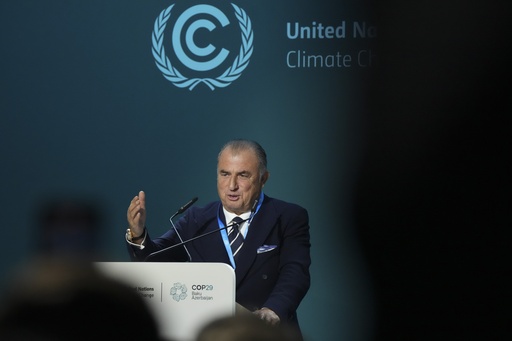
BAKU, Azerbaijan — For nearly ten years, Pragnya Mohan has pursued a career as a triathlete, but the intense summer heat in her home country of India has made training increasingly difficult. Seeking refuge from the soaring temperatures, she has relocated her training efforts to the United Kingdom. However, she expresses concern about a future where climate change might ultimately threaten her sport’s very existence.
In the context of rising global temperatures, American discus thrower Sam Mattis recalled experiencing extreme heat reaching as high as 44 degrees Celsius (111 degrees Fahrenheit) during the 2021 U.S. Olympic trials in Eugene, Oregon, which caused several people—including fans, officials, and athletes—to faint. Similarly, New Zealand soccer player Katie Rood shared her experience of training inside heat chambers in preparation for the Tokyo Olympics, along with having to cut warmup sessions short due to oppressive heat and humidity.
These athletes voiced their concerns during a panel discussion at the United Nations climate summit in Baku, Azerbaijan, highlighting the looming threats posed by climate change to themselves, their fans, and the sporting world at large. With an audience of billions globally, these sports figures are among many advocating for increased awareness and action on climate issues.
Mohan warned, “If climate change is not properly addressed, triathlons may become obsolete in the future.” She elaborated that this year’s Paris Olympics had to delay some triathlon competitions due to heavy rainfall, which has increased due to a warming atmosphere holding more moisture, resulting in elevated bacteria levels in the Seine River.
In response to these challenges, some prominent soccer clubs have formed a climate action alliance aimed at minimizing their carbon footprints and motivating fans to engage with climate issues. Real Betis, a club from La Liga, is one of the participating teams. Rafael Muela Pastor, the club’s foundation general manager, emphasized the importance of soccer as “the most powerful and massive sport in the world,” stressing the need for significant action in response to climate change.
Leslie Mabon, a lecturer on environmental systems at the Open University in the UK, noted that while athletes can raise awareness about climate change, transformative activism often arises from different sectors. “Some athletes can make a difference, but often it’s not at the topmost levels,” she explained. The financial stakes involved can make it challenging for major governing bodies, like FIFA, to take meaningful action.
FIFA has previously been criticized for its indifference to issues of heat stress and human rights regarding the hosting of the 2022 World Cup in Qatar. Recently, FIFA President Gianni Infantino promoted a partnership with Pacific Island nations during COP29 that aimed to support “climate-resilient football development,” yet this came on the heels of a sponsorship deal with Saudi Arabia’s state oil company, Aramco—actions that left some questioning their sincerity.
In an open letter, women’s soccer players worldwide urged FIFA to sever ties with Aramco, citing human rights concerns and the implications of fossil fuel production on climate change. Despite requests for comments, FIFA has remained silent on the matter.
Mabon remarked, “When major organizations participate in such deals, it undermines the credibility of any positive initiatives they attempt to promote.”
The ramifications of climate change extend beyond moral considerations; they also influence the cost of participating in sports and amplify existing inequalities. Jessica Murfree, an assistant professor of sport administration at the University of North Carolina, pointed out that as certain regions become inhospitable due to extreme heat or insufficient snowfall, athletes will find themselves having to travel farther and expend more resources to train and compete. “This creates significant issues for aspiring athletes, exacerbating socioeconomic disparities that lead to further justice concerns,” she stated.
In adapting to a warming climate, sports organizations have started moving events to other locations or changing event timings to cooler parts of the day. Technological solutions have also been employed, such as Qatar’s investment in air-conditioned stadiums during the World Cup, meant to keep fans and players comfortable.
However, Rood cautioned that relying on such cooling methods is not a viable long-term solution. “It requires immense energy, which takes a toll on the environment,” she said, underscoring that the challenges extend beyond just a few isolated events. “Training conditions cannot always be replicated every time.”
For Tina Muir, a former competitive runner from the UK advocating for climate awareness through her organization, Running for Real, the outlook is grim. She emphasized that athletes are often inclined to push their limits, which could have dire consequences.
“It might turn into a battle of endurance for many competitors,” Muir noted, suggesting that athletes might find themselves facing harrowing conditions that challenge their physical safety while risking longer-term health damages in the pursuit of their ambitions.
